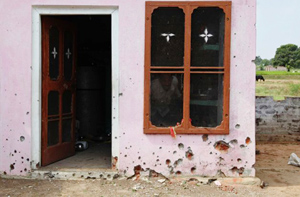Jammu, Oct 9: India and Pakistan traded heavy mortar and gun fire along the international border with Pakistani troops targeting 60 outposts and 90 villagers overnight in Jammu, Samba and Kathua districts, leaving eight persons, including three BSF jawans, injured.
Pakistan Rangers shelled almost the entire 192-km border during the night. Nearly 30,000 people have been displaced following one of the worst violations of the 2003 ceasefire by Pakistan which has left eight people dead and 80 others, including nine security men, injured since October 1.
"Pakistani Rangers continued with unprovoked mortar shelling and heavy automatic weapon firing on BSF posts all along International Border (IB) since 2045 hours last night", a BSF spokesman said today.
"Almost the whole stretch of International Border in Samba, Hiranagar, Ramgarh, Arnia, R S Pura, Kanachak and Pargwal (Sub-sectors) was affected in the firing," he said.
"About 60 BSF border outposts were affected by the fire from Pakistan side," the spokesman said, adding BSF troops retaliated in a "calibrated manner".
Firing exchanges were continuing till this morning in Pargwal, Kanachak, Arnia and Samba sub-sectors.
Home Minister Rajnath Singh today said the defence forces were giving a "befitting" reply to the Pakistani onslaught and the country will not bow down before anyone.
"I want to assure the people that we will not let down our country," he said, a day after Prime Minister Narendra Modi asserted that "everything will be fine soon" on Pakistan border.
"The Prime Minister is keeping a close eye on the situation. He does not need to speak as our Army and BSF personnel are giving a befitting response and we are satisfied with it," Singh said amid questions being raised by the Opposition on government's reponse to the ceasefire violations by Pakistan.
According to officials, over 90 border villages have been hit by mortar shelling and firing by Pakistan since last night. While 57 hamlets were hit in Kathua district, others have been targeted in Jammu and Samba districts.
"Five civilians and 3 BSF jawans were injured in shelling and firing," District Magistrate, Jammu, Ajeet Kumar Sahu told PTI.
Three of the civilians were injured in Kanachak belt.
However, the guns were silent along Line of Control (LoC) in Poonch district.
Over 30,000 people have been evacuated from border hamlets along IB in Jammu, Kathua and Samba to safer places in view of the shelling, the DM said, adding that relief camps have been set up for them.
"Over 20,000 people have migrated from border hamlets in Jammu," Sahu said. In Kathua and Samba, over 7,000 and 3,000 border people have migrated, officials said.





Comments
Add new comment